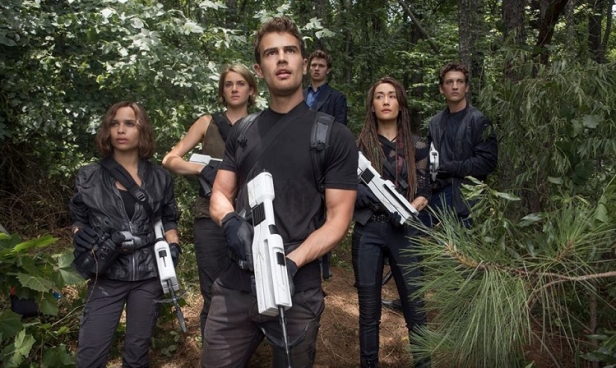When we last saw Tris Prior (Shailene Woodley), she had just revealed the existence of the human race beyond the wall surrounding her post-apocalyptic Chicago, but a happy ending was too much to ask for.
Evelyn (Naomi Watts) is the new leader of Chicago following the overthrow of Jeanine in Insurgent, but her regime is no better than the one that went before. It’s up to Tris, Four (Theo James), reluctant ally Peter (Miles Teller) and her traitor brother Caleb (Ansel Elgort) to break out of Chicago and see for themselves what’s beyond the wall. The answer is predictably grim: A war-ravaged but super-advanced society, overseen by Jeff Daniels in benevolent dictator mode.
The third film in the series is much the same as what came before – an exploration of the corrupting nature of power and control in an industrial-punk society in which advanced holographic technology is achievable but soft furnishings are not.
The main difference here is that Tris is no longer the always-right pariah of goodness – here, she gets a taste of flattery and power and, like all the characters in the series, reacts poorly. It’s up to Four, usually sidelined, to do the lion’s share of the heroics. He carries the bulk of the middle portion of the movie, and most of the major twists are revealed through his eyes. James is a capable and likeable action movie lead, but he lacks Woodley’s capacity for empathy. Without Woodley centre-stage, the film loses the emotional impact the twists might have had.
Elsewhere, the cast are sparingly used. Elgort, a man who in another franchise would be the action-heavy lead, is surprisingly good as the cowardly and ungainly Caleb, constantly apologising for his uselessness while navigating the bumpy path of redemption. Miles Teller continues to be classier than the movie deserves, as does Naomi Watts as the increasingly conflicted Evelyn. Other characters are sidelined so much that sometimes the film forgets they’re there (why would any film willingly underuse Octavia Spencer?).
The film looks great, and it creates two stunning new worlds – the radioactive Martian landscape outside of the wall and the utopian, high-tech societies it holds. Evelyn’s factionless domain is a triumph of production design, with scraps of wallpaper from the old Chicago still clinging to ruined walls. Unfortunately, the set is full of characters who seem to have wandered in from the Matrix rave scene.
There are some great action sequences, especially the thrilling escape from Chicago and the introduction of some honest-to-goodness sci-fi flying ships, some of which seem to owe a debt to the good ship Serenity. The special effects are classy, and an improvement on the often weightless Insurgent. The film also benefits from the fact that, for once, none of it takes place in the characters’ minds. Despite that, none of the action sequences manage to achieve any real sense of danger, even though the film diverts dramatically from the plot of the book.
Like many book adaptations, the Divergent series is turning the final book into two films. As a result, the climax created for this film feels false and temporary, and leaves you in no doubt of a quick resolution just in time for everyone to team up for the big finale – which we won’t see until the next film.
The Divergent series has always lacked the emotional or thematic impact of some other recent YA films. The Hunger Games had more interesting things to say about class and power, and while Allegiant introduces some big ideas about whether you need to be ‘pure’ to be whole, it ultimately doesn’t fix any of the problems that the earlier films had.
